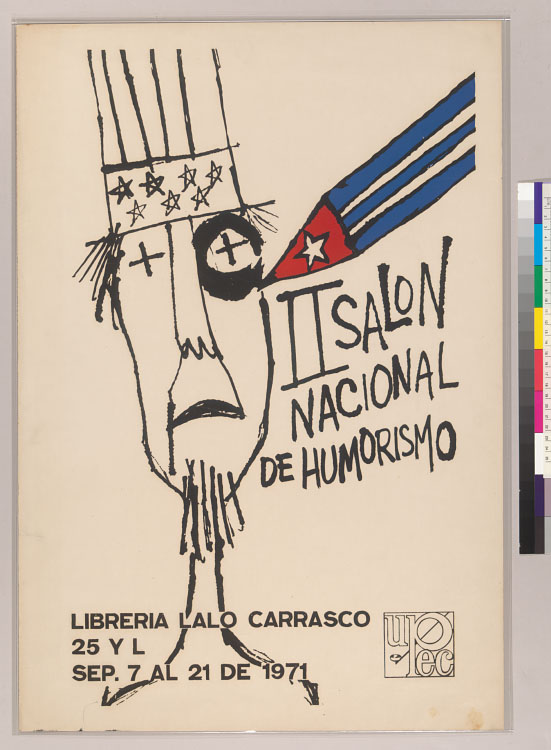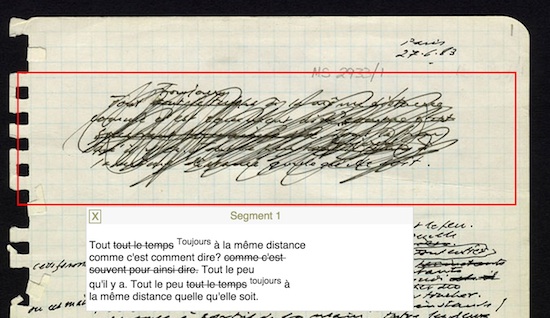Tag: digital collections
Resources from the Center for Research Libraries
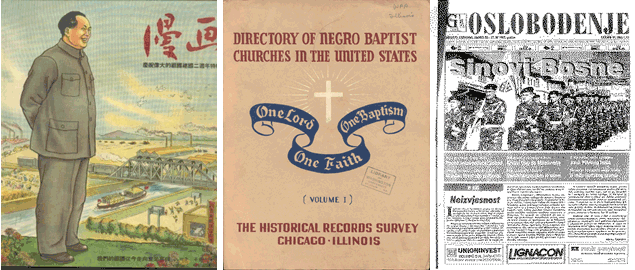
The UC Berkeley Library is a member of the Center for Research Libraries (CRL), a partnership of more than 200 university, college, and independent research libraries. CRL acquires and preserves newspapers, journals, government documents, archives, and other primary source materials from a global network of sources, making them available to researchers through interlibrary loan and digital delivery.
CRL’s deep and diverse holdings support research in the history of science, economics, law and government, immigration and population studies, international diplomacy, and cultural studies.
- Largest collection of circulating newspapers in North America (more than 16,000 titles with strengths in various global areas and historical U.S. ethnic titles)
- Primary legal and government resources, including foreign and U.S. state documents
- Over 800,00 foreign dissertations (mostly from European institutions) dating back to the 1800s
- Area studies materials—major microform and paper collections from Africa, Latin America, Eastern Europe, the Middle East, South Asia, and Southeast Asia
CRL functions as a branch library of extraordinary resources with user-focused services.
- Rapid turnaround of loan requests and project-length loan privileges from CRL’s five million items
- Digitized collections offering over 50 million pages scanned by request or in partnerships
- Document delivery of articles from the Linda Hall Library of Science, Engineering, and Technology
- Demand purchase of new materials in three areas of collection strength: foreign dissertations, newspapers, and microform archives
For more information on CRL collections: CRL’s online catalog (holdings are also listed in WorldCat and in some cases in OskiCat)
For more information about the CRL: please contact Liladhar R. Pendse
(Lpendse (at) library.berkeley.edu), UCB Library coordinator for the CRL.
Cairn ebooks
The Library will have trial access through April 15 to the complete collection of ebooks on Cairn, an online platform for interdisciplinary journals and books published in France and Belgium. Some representative publishers include Presses Universitaires de France, Presses Universitaires de Vincennes, Presses de Science Po, Le Seuil, Tallandier, La Découverte, Karthala, De Boeck Supérieur, Picard, Kimé, and more.
Cairn.info, created in 2005 by a small group of publishers, offers the most comprehensive collection of journals available online in the French language. The project, supported by the Bibliothèque nationale de France and the Centre national du livre, makes available an increasing number of scholarly journals and now books in the various fields of the humanities and social sciences.
Feedback can be sent to cpotts [at] berkeley.edu.
Professor Susan Ervin-Tripp: 2016 Class of ’31 Interviewee in University History
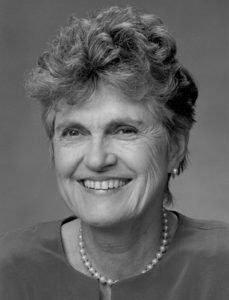
One of the great joys of being an oral historian is getting to talk to people you otherwise wouldn’t have known. We have the privilege of asking people about their lives, putting their experiences in context of the larger historical landscape, posing questions that others don’t have the opportunity to ask. I had the opportunity to do just this when I interviewed Professor Susan Ervin-Tripp in 2016.
Professor Dan Slobin puts it best in the introduction he wrote for Ervin-Tripp’s oral history:
Throughout her long and productive career, Susan Ervin-Tripp has repeatedly been a path-breaker. And the paths that she helped explore have become well-traveled roads. I is remarkable to see so many innovations in one life story: psycholinguistics and sociolinguistics, embracing new directions in the study of first-language acquisition as well as bilingualism; repeated applications of new technology: computers, tape recorders, video recorders, wireless microphones; design of new methods of transcribing and documenting the many layers of speech interaction; cross-linguistic and cross-cultural research, with attention to both individual and interpersonal dimensions of language. Along with these contributions to the scientific side of her profession, Ervin-Tripp has given equal attention to the institutional and political dimensions of academia, focusing on the treatment of women and minorities. Wherever possible, she used her academic skills as a psycho- and sociolinguist to provide a scientific foundation to her advocacy.
Slobin is not the only one who values Ervin-Tripp’s many contributions. Her interview was part of our Class of ’31 series, in which faculty and staff, both current and retired, are nominated by admirers to the subject an oral history. Ervin-Tripp received numerous, passionate nominations which conveyed a resounding eagerness to document her work in academics and equity, knowing that we could all benefit from learning about her trailblazing work.
I sat down with Ervin-Tripp for our first interview in May of 2016. It was immediately clear that she was a practiced speaker, having taught for many years, with a healthy sense of humor. She was poised and articulate, prepared with her notes. Over the course of our six hours of interviews, we discussed her childhood during the Great Depression in Minneapolis, Minnesota, her undergraduate education at Vassar College, her doctoral work at the University of Michigan, and her career at UC Berkeley, which began in 1958. She detailed her work on the Southwest Project in Comparative Psycholinguistics studying the connection between language and cognitive performance, her time as a professor in the Psychology and Speech Departments at Berkeley, her early adoption of technology in her research, her participation at Stanford University’s Center for Advanced Studies in the Behavioral Sciences and with the 1985 Scientific Exchange program in France. She talked about the significant advances that she made for women’s equality on campus and the multiple efforts she made to create such change.
It was a pleasure to have interviewed a woman whose career has impacted Berkeley so greatly. There are many lessons to learn from this interview, particularly the courage and persistence it takes to create an equitable environment. Professor Susan Ervin-Tripp’s oral history is one that is rare for her generation and one that should be celebrated.
Shanna Farrell, Interviewer, Oral History Center
Gallica Gives
Online since 1997, Gallica remains one of the major digital libraries available for free on the Internet. With more than 12 million high-resolution digital objects from the collections of the Bibliothèque Nationale de France (BnF) as well as from hundreds of partner institutions, it includes books, journals, newspapers, manuscripts, maps, images, audio files, and more. The illustration above “Ça, mon enfant, c’est du pain.. [That, my child, is bread…]” by Fernand-Louis Gottlob was published in one of the first issues of the weekly satirical magazine L’Assiette au beurre (1901-1936) which is also held in print at UC Berkeley. Committed to the ever-evolving needs of its user community, Gallica’s social media outlets include Facebook, Twitter, Pinterest and even a BnF app.
The Library’s Cuban Poster Collection
More than a decade ago, the Library digitized close to 350 original cultural and political posters from Cuba acquired by retired librarian Carlos Delgado through the exchange program he set up with the José Martí National Library of Cuba in 2000. All are searchable by title, keyword or publisher in the Colección de Carteles Cubanos online database and in the Online Archive of California (OAC) with another 200 slated to be added this year. The posters capture the broad range of national and international campaigns of Fidel Castro’s regime but also a unique perspective on the world through promotional art for exhibitions, performances, festivals, and conferences held on the embargoed Caribbean island nation in the last four decades of the twentieth century.
Beckett Digital Manuscript Project
RSC Historical Collection
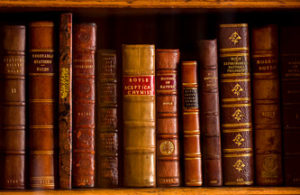
The Royal Society of Chemistry Historical Collection covers nearly 500 years of the development and evolution of the chemical sciences. Books, journals, letters, lecture notes, pamphlets, monographs, plus minutes and publications from learned societies are included. Some highlights of the collection:
- materials on alchemy and early chemistry dating back to the early 16th century
- materials on explosives and firearms dating back to 1598
- materials formerly in the possession of the family of Sir Humphry Davy and containing items from Antoine Lavoisier, John Dalton and Justus von Liebig, among others
- backfiles of the journal Education in Chemistry
To access the RSC Historical Collection, go to Historical books and papers or Society publications and minutes.
Manuscripts of Slavery Collection from the XULA Library Archives & Special Collections
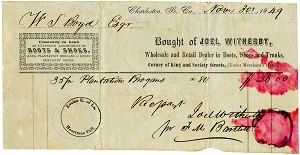 The Xavier University of Louisiana Library Archives and Special Collections is in the process of digitizing and making accessible the Charles F. Heartman Manuscripts of Slavery Collection, which includes materials dating from 1724 to 1897 relating to the social, economic, civil, and legal status of slaves and free people of color in Louisiana. Currently there are over 2,100 viewable items on the website, consisting of over 8,000 manuscript pages.
The Xavier University of Louisiana Library Archives and Special Collections is in the process of digitizing and making accessible the Charles F. Heartman Manuscripts of Slavery Collection, which includes materials dating from 1724 to 1897 relating to the social, economic, civil, and legal status of slaves and free people of color in Louisiana. Currently there are over 2,100 viewable items on the website, consisting of over 8,000 manuscript pages.
According to the collection guide, “approximately half of the Charles F. Heartman collection consists of municipal records from city of New Orleans. Clerical books, especially those of the Third Municipality, provide valuable information on the labor and leisure activities of slaves in the early nineteenth century. The city also had the largest concentration of Free People of Color in the nation, and encompassing tax records and business bonds reflect their economic activity. There are also rosters of Negro soldiers in the U.S. Army during the Civil War, and records of societies of Freemen dating from Reconstruction and beyond.” The collection includes records in French, English, and Spanish.
Bancroft Library Processes First Born-Digital Collection
The Bancroft Library’s Digital Collections Unit recently finished a pilot project to process its first born-digital archival collection: the Ladies’ Relief Society records, 1999-2004. Based on earlier work and recommendations by the Bancroft Digital Curation Committee (Mary Elings, Amy Croft, Margo Padilla, Josh Schneider, and David Uhlich) we’re implementing best-practice procedures for acquiring, preserving, surveying, and describing born-digital files for discovery and use.
Read more about our efforts below, and check back soon for further updates on born-digital collections.
State of the Digital Archives: Processing Born-Digital Collections at the Bancroft Library (PDF)
Abstract:
This paper provides an overview of work currently being done in the Bancroft’s Digital Collections Unit to preserve, process, and provide access to born-digital collections. It includes background information about the Bancroft’s Born Digital Curation Program and discusses the development of workflows and strategies for processing born-digital content, including disk imaging, media inventories, hardware and software needs and support, arrangement, screening for sensitive content, and description. The paper also describes DCU’s pilot processing project of the born-digital files from the Ladies’ Relief Society records.
Rekishiteki Ongen (Rekion) Now Available at the East Asian Library
The C. V. Starr East Asian Library at UC Berkeley has recently registered to access to Rekishiteki Ongen (Rekion) (http://rekion.dl.ndl.go.jp/) the Japanese Historical Recordings Collection provided by the National Diet Library (NDL). Compiled by the Recording Industry Association of Japan (RIAJ) in cooperation with the NDL, this archive consists of over 48,000 digitized recordings from 1900-1950. With this registration, UC Berkeley faculty and students are now able to access any of the over 47,000 historical recordings marked as “Available only at the NDL/Rekion partner libraries” in the website on the dedicated public PC in the East Asian Library (please ask at the Circulation Desk for the dedicated PC and its ID/password for access). To use the Rekion collection at the Library, please bring your own headsets.
If you would like to see the list of all 48,000+ recordings offered at the Rekion website, click “Browse all recordings” link in “Browse by Title” box. Although the audio files cannot be downloaded, we still hope that the availability of these resources will assist your research in Japanese culture and history, music, and other subjects.
If you have any questions or comments on this resource, please contact Toshie Marra.


!["Ça, mon enfant, c'est du pain.. [That, my child, is bread...]" par Gottlob in L'Assiette au beurre (1901)](https://s3.amazonaws.com/libapps/accounts/5279/images/assiette-au-beurre.jpg)
